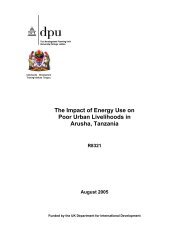EPA Review Annex Documents - DFID
EPA Review Annex Documents - DFID
EPA Review Annex Documents - DFID
Create successful ePaper yourself
Turn your PDF publications into a flip-book with our unique Google optimized e-Paper software.
5. Qns: Had you had more resources, would the outcome have differed? If so, in what<br />
way?<br />
Ans: Yes. With more resources the country (and other ACP/ESA countries) could have<br />
conducted more detailed sectoral studies to get an in-depth understanding of the merits<br />
and demerits of joining the <strong>EPA</strong>. Also the country could have done more capacity<br />
building, especially in the form of training of negotiators. Armed with these studies and<br />
more human capacities, the outcome of the <strong>EPA</strong> negotiation was likely to be different as<br />
the country (or ESA group) was going to have greater chance of negotiating and getting<br />
favourable positions based on enhanced, clearer, firm and strong negotiating positions.<br />
6. Qns: How does the fact that negotiations were conducted at the regional level impact<br />
the pace and outcome of negotiations? Do they save or consume resources?<br />
Ans: At the beginning, negotiations at the regional level were generally good as most<br />
regional (ESA) member states had similar interests and held harmonised positions.<br />
However, as time progressed and divergences arose regional member countries’<br />
positions were not kept intact. This resulted in some original ESA member countries<br />
initialling interim <strong>EPA</strong> with EU as a subset group called EAC which weakened the<br />
outcome of ESA negotiations. Therefore, conducting negotiations at the regional level<br />
where member states had (have) different positions have not helped the outcome. Due<br />
to the absence of consensus at regional level on major issues, it was impossible to get<br />
the desired outcome, and that might have been an inefficient use of the scare resources.<br />
7. Qns: Do you see the <strong>EPA</strong>s as an instrument for development? Why?<br />
Ans: Yes and No.<br />
a) Yes, <strong>EPA</strong> can possibly be an instrument for development as it promises and calls for<br />
building human; institutional, and infrastructural capacities (in ESA countries), and<br />
introduces efficiency through competition.<br />
b) Yes, if the development aspect of the negotiation is given both due priority and<br />
maximum attention, with legally binding commitments being included in the final<br />
comprehensive <strong>EPA</strong> document to be signed once agreed.<br />
c) No, if the development aspect of the negotiation is not given due priority and maximum<br />
attention. In that case <strong>EPA</strong> would be an unrealistic aspiration for the least developed<br />
countries (LDCs).<br />
8. Qns: So far in your opinion, has the <strong>EPA</strong> process enhanced or hindered development<br />
progress in your country?<br />
Ans: Partly Yes and partly Not yet<br />
a) Partly Yes in that the process has initiated Ethiopia (ESA States) to take inventory of the<br />
various sectors, conduct assessment studies, involve stakeholders around common<br />
agenda and created awareness so that effort is made to be effective and efficient in<br />
business.<br />
b) Partly Not yet since the <strong>EPA</strong> is still in the negotiation stage, no concrete agreements<br />
have been implemented (so cannot infer their development impacts at this point).<br />
9. Qns: Would you have preferred to negotiate some of the elements of the <strong>EPA</strong>s<br />
differently? If so, in what aspects?<br />
Ans: Yes. The development cluster (or aspects) should have been given more attention<br />
during the negotiations. Also trade in services should come at the later stage in fact after<br />
testing the development part of the agreement of the partnership.<br />
110
















